
Sandwiched between the generations Learning to manage being spread too thin Vol. 005 | No. 12 13 April 2024 AUD $1.00 PRINT POST APPROVED PP100001474 salvosonline.org.au FEATURE Caring and kinship FAITH TALK Where to start? OUR STORY A voice for change

‘‘We are like books. Most people only see our cover, the minority read only the introduction, many people believe the critics. Few will know our content.’’
–
Zola
Émile
The Salvation Army is about giving hope where it’s needed most.
What is The Salvation Army?
The Salvation Army, an international movement, is an evangelical part of the universal Christian Church.
Vision Statement
Wherever there is hardship or injustice, Salvos will live, love and fight alongside others to transform Australia one life at a time with the love of Jesus.
Mission Statement
The Salvation Army is a Christian movement dedicated to sharing the love of Jesus by:
• Caring for people
• Creating faith pathways
• Building healthy communities
• Working for justice

The Salvation Army Australia acknowledges the Traditional Owners of the land on which we meet and work and pay our respect to Elders, past, present, and future. We value and include people of all cultures, languages, abilities, sexual orientations, gender identities, gender expressions, and intersex status. We are committed to providing programs that are fully inclusive. We are committed to the safety and wellbeing of people of all ages, particularly children.
Salvos Magazine
Founders William and Catherine Booth
Salvation Army World Leaders
General Lyndon and Commissioner Bronwyn Buckingham
Territorial Leader Commissioner Miriam Gluyas
Secretary for Communications and Editor-In-Chief
Colonel Rodney Walters
Publications Manager Cheryl Tinker
Editor Simone Worthing
Graphic Designer Ryan Harrison
Enquiry email publications@salvationarmy.org.au
All other Salvation Army enquiries 13 72 58
Press date 28 March 2024
Printed and published for The Salvation Army by
Commissioner Miriam Gluyas at Focus Print Group, South Granville, NSW, Darug Nation lands.

salvosonline.org.au

Faith Talk [10]
Where to start?


[12]
A balancing act
As we grow older, many of us are faced with the joys, and the challenges, of caring for different generations of our families. While this can be a wonderful time of life, it can also involve the struggle of trying to balance multiple roles and stay healthy, working, financially viable and generally well in the process.
In our features this week, Faye Michelson looks at the ‘sandwich generation’ and the importance of self-care in avoiding overload and burnout. Lucy Davis looks at the dedication needed in kinship care and how one Indigenous family, with commitments of their own, lovingly care for their elderly mum.
In Faith Talk, Mal Davies kicks off a threepart series on the Bible – what this book is all about, and how to effectively read and understand its timeless message.
My Story becomes Our Story this week as we explore the role of the Salvos Policy and Advocacy team and the specialised work they do in contributing to positive change across Australia.
For these stories and more, go to salvosonline.org.au
Simone Worthing Editor
3
CONTENTS
voice
change
Our Story
A
for
between the generations
Feature [4] Sandwiched

Sandwiched between the generations
How to cope when you feel like you’re spreading yourself too thin
By Faye Michelson
Take a thick slice of bread, spread a smidge of butter thinly on top. Add a layer of jam and spread it over the butter – that’s too much, scrape some off. Now, add another slice of thick bread.
A SANDWICH GENERATION
If you’re one of the ‘sandwich generation’, you may identify with that picture – someone who is spread very thinly between responsibilities to their ageing parents on one hand and their adult children (and perhaps grandchildren) on the other.
responsibilities can take a toll on your finances, health, career opportunities and general well-being. Such a relentlessly busy life, sandwiched between meeting the needs of different generations, can put you at risk of burnout.
Juggling multiple responsibilities can take a toll …
SEEING THE DANGER SIGNS

An increasing number of Aussies are finding themselves sandwiched between meeting the needs of the different generations of their families. The 2022 Household, Income and Labour Dynamics in Australia (HILDA) Survey found several reasons for this. Topping the list are younger people living at home for longer while the needs of the elderly are increasing because they are living longer. The survey also indicates that women are more likely to be doing the caring; women aged between 50 and 69 are the biggest providers of unpaid, ongoing care in the community.


Colleen Morris, counsellor and family therapist at Watersedge Counselling in Geelong (Vic.), says there are danger signs of burnout to look out for.

Supporting aged relatives can be an honour, an expression of gratitude. Caring for your grandchildren can be a joy, and wanting to be there for your children is natural because you love them. None of this is diminished, however, by recognising how juggling multiple



“These include constant lethargy to the point of exhaustion, always feeling stressed, having no time to spend with family and friends, experiencing ‘odd’ negative physical symptoms for no apparent reason,” Colleen explains. “So is always feeling irritable and refusing to stop, rest or take time off.”

It makes sense for carers to take care of themselves. But it’s more than acknowledging that their ability to continue caring for others will be reduced if they are





4 FEATURE





unwell themselves. It’s acknowledging that the people who give so much of their time, energy, love and resources to give quality of life to others should also have a quality life. Yet it is often difficult to ask for help without feeling guilty and to know it’s not selfish to yearn for some time to yourself.
MANAGING OVERLOAD
If you feel like you’re being spread too thinly, what can you do to manage the situation?
through daily phone calls, Facetime and messages.
• If you need a break, try a kind but firm ‘no’, particularly if it’s a non-urgent request for assistance or childcare. “I’m sorry, but I can’t help you out at that time.”
Carving out time for yourself will be a challenge, but Colleen says self-care can be simple, adding that it needs to be something you do regularly to receive the most benefit.

• Share the load. Consider support services you could access, such as in-home services to help with shopping or housework.
• Organise a roster among family and friends to ensure older parents have regular visitors apart from you.
• If you’re providing regular childcare for grandchildren, consider taking a ‘day off’ every now and then by using occasional day care.
• Keep in touch with older relatives without always visiting in-person

“Get in touch with what it is that makes you feel happy and relaxed and make time, however brief, to do it,” she advises.
“Do something physical each day, such as a walk, yoga, and connect with a friend as often as you can.”

Scan here to read more stories of hope.


FEATURE
13 A PRIL 2024
Caring and kinship
Navigating life, work and family commitments
By Lucy Davis
My mum was a schoolteacher and often reminisces about how she and my father met on the train in the great South Burnett – Wakka Wakka Country.
My mother is from Scottish heritage and my father is of Aboriginal-South Sea Islander descent. Their relationship would have stood out, particularly considering colonial history in Queensland towards First Nations peoples. My dad was a tall, handsome black man often referred to by his family as the ‘Black Swan’. My mum was a shy, pretty, non-indigenous schoolteacher. Two opposites that found a love for reading and a love for God.
My mum and dad separated when I was quite young, leaving Mum a single parent of five kids. Mum raised us in a little three-bedroom housing commission home in Eagleby (Yugambeh Country), 39km south-east of Brisbane.
Every day Mum would walk 5km into Beenleigh, her canvas backpack on to carry out her business – shopping on a tight budget or going to the Beenleigh library. Mum loved the library and probably still has a list of overdue books!
All that walking has obviously blessed Mum with good health as we celebrate her 84th birthday in June.
ROSTER OF CARE
Mum’s mind is sharp as a knife, and she will correct your grammar before you finish a sentence. Age, though, has slowed her down, and now our old Ma needs help
moving around her house and going to bed. All five of us siblings are on a sevenday roster, taking turns to give Mum lunch and put her to bed. It’s a full-time commitment and we must work together to ensure her independent living.
With the support of our local Indigenous medical service, we have created a good aged-care package that includes daily showers and interactions with workers, house cleaning and lawn maintenance.
In Aboriginal culture, our kinship system is important.
My working week as the Reconciliation Action Plan Manager for the Salvos includes clear precision coordination as I make sure I am not travelling on the days I am rostered for Mum’s care. However, some days you may find me in my mum’s glorious green garden on an online meeting, or sitting at the desk my sister set up to manage her travels between Sydney and Eagleby to complete her shifts on the roster.
To us kids, a nursing home is not an option. In Aboriginal culture, our kinship system is important. Our Elders are held in the highest regard – they are the teachers, the holders of story and
SALVOS MAGAZINE 6 FEATURE
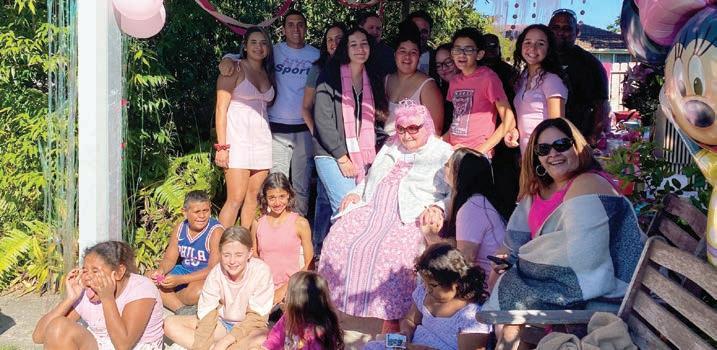
dance, and they are the decision makers. Even though Mum is non-Indigenous, she still holds this title, not only to us kids but in our community. How could it be any different when she has raised all five of her children to be teachers in our communities, carers and role models?
JUGGLING ACT
Work life balance is a tricky one to navigate for me personally, as I am a single mum as well. But caring for my kids and my mum comes naturally. Mum cared for us and now it’s our turn to care for her.
As life throws many challenges at us, we as a family have learnt two important things: Firstly, that we never make Mum feel like she is a burden, and two, that it’s important to share the responsibility of Mum’s care by allowing us to have breaks in the roster and weekends off.
We also have ‘rules’ that we try to abide by to make Mum’s care run smoothly. One rule is to try to put mum to bed before 8pm. Another is to try not to give Mum sweets and chocolate to avoid severe consequences. I confess I am guilty of breaking both rules. I can be so
tired just being a single mum and working full-time that it’s common to find me and Mum binging on some ridiculous Netflix series while enjoying a packet of Tim Tams – Mum going to bed well past 8pm.
Sometimes Mum calls me at all hours of the night to come over and help due to an accident she may have had. I have to get my kids up and sometimes they will growl and be grumpy from disrupted sleep. I always tell them that it’s a blessing to look after our old people – they teach us patience, gratitude and love, and these blessings will be returned.
We as kids are eternally grateful to our mum and will continue to care for her for as long as we can, always showing her love and dignity.
Lucy Davis is Reconciliation Action Plan Manager living on Yugambeh Country, Brisbane.
Scan here for more information on Salvation Army services.
7 FEATURE
13 A PRIL 2024
Lucy, right, with her mum, centre, and members :of her extended family.
Salvos team stars at awards
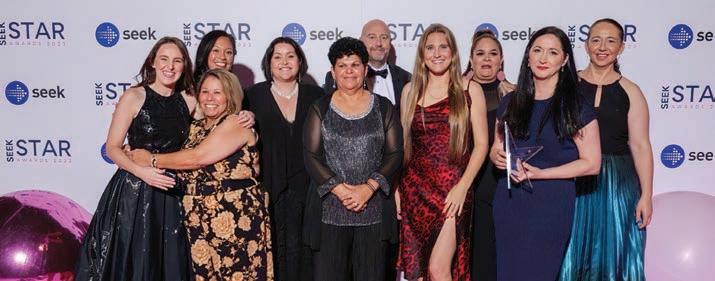
The Salvation Army’s Aboriginal and Torres Strait Islander Recruitment and Retention Working Group was named the winner in the Best Diversity, Equity and Inclusion Initiative Category at the 2023 SEEK STAR Awards.
“The criteria for the award were to ‘Treat diversity, equity and inclusion as integral to our organisation, and have an attraction strategy that supports that’,” explained Shirli Congoo, General Manager, Aboriginal and Torres Strait Islander Ministries.
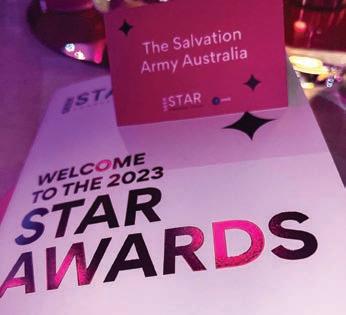
“Our strategy was to form a working group for Indigenous Recruitment and Retention. We reviewed and changed systems, policies and practices, which led to a 40 per cent increase in Indigenous staff and reduced the turnover of Indigenous staff by 18 per cent.”
Other finalists in the category included Westpac Group, Deloitte, Commonwealth Bank and FDM Group.
The working group was established in 2020 following the launch of The Salvation Army’s Reconciliation Action Plan. It is a highly collaborative group that supports and respects ideas.
The Working Group developed the Recruitment and Retention Toolkit that provides guidance and support to managers who are recruiting Aboriginal and Torres Strait Islander peoples to ensure a culturally safe candidate journey.
The STAR Awards (SEEK Talent Acquisition and Recognition Awards) acknowledge excellence in talent acquisition in Australia and celebrate the integral role talent teams play in an organisation’s success.
SALVOS MAGAZINE 8
NEWS
The jubilant Salvation Army team celebrates winning the STAR SEEK award in Melbourne last month.
Off the Shelf
eAn occasional column on all things books and reading

To e-read or not to e-read
When e-readers first burst onto the book scene in the early 2000s, many predicted the death of the print book. Happily, 20 years on, both formats are thriving. But which is better? As a reader with one foot planted firmly in each camp, let me share where I think each format excels.
Let’s start with the good old-fashioned paperback or hardback. It’s hard to beat the sensory experience offered by a ‘real life’ book – the texture of the pages, the smell (usually delightful, unless it’s musty!), the gorgeous covers that often make books objects of beauty.
Seeing your bookmark edge closer and closer to the back cover is far more satisfying than knowing you are 64 per cent of the way through your novel, with a predicted 3 hours and 14 minutes left (à la e-readers). But, on the digital side of the bookshelf,
where e-readers really do shine is on holidays. Why pack just one or two heavy books when you can carry a whole library in one small device. When you finish one book in a series, the next title is a few taps of the screen away. (E-books generally cost less than paperbacks, too, which eventually helps offset the initial cost of an e-reader.)
Most e-readers have built-in backlights, which means you can ditch your booklight and still read anytime day or night. Can’t find your glasses? Just super-size the font and keep on reading.
The choice between e-readers and traditional books is really a matter of taste, lifestyle and finances. There’s a welcome place for both in the reading life and each has clear advantages.
Long live books … however you read them.
– Andrea Redford
9
OFF THE SHELF
13 A PRIL 2024
Where to start?
Learning to read the Bible for all its worth
In the first of a three-part series, MAL DAVIES talks about the world’s bestselling book – the Bible – how to get started on reading it and what it’s all about.
If you do a Google search on ‘the Bible’ you will get nearly two billion (not million: billion) results. For the sake of comparison, a search on ‘Shakespeare’ will give you half-a-billion results as will a search on ‘Harry Potter’.
The Bible is history’s bestselling book and is the most read, studied and taught book ever. There is simply no comparison to the book; nothing even comes close.
Clearly, there is some value in reading the Bible, but it’s also a large book, imposing for non-readers, and so the challenge is: How do I read the Bible? The answer depends on what you’re trying to find out and, so, perhaps the first question is: Why do you want to read the Bible?
For the vast majority of people, the interest is in finding out about Jesus. Who was he? What did he say? What did he do? Why is he important? Why did he die on a cross? Did he really come back to life? What was he like?
STARTING POINT
To get to the heart of this, you don’t want to start at the first book of the Bible called Genesis (note that the Bible contains 66 different books – 39 in the Old Testament and 27 in the New Testament), you want to start at a series of books called the ‘Gospels’.
‘Gospel’ comes from an old word meaning ‘good news’. In the Bible there are four books named after their authors:
Matthew, Mark, Luke and John. These books are each someone’s version of the life of Jesus; they tell the gospel/good news of Jesus and his life and ministry.
We’re fortunate to have not just one person’s take on the life of Jesus but different views that give us a fuller, more complete picture of Jesus’ life.
The books (Gospels) are quite short and easy to read. The shortest one is the book of Mark at just 16 chapters and about 100 pages long. If I’m with someone who says they want to read about Jesus in the shortest possible time, I give them a copy of Mark’s Gospel. If, as I’ve suggested, you want the full picture, read all four Gospel accounts of the life of Jesus.
ALL ABOUT JESUS
So, if that’s the important stuff – learning about Jesus – what’s the rest of the Bible about? Well, to really confuse you, it’s also about Jesus.
Let me explain that. The key figure in world history is Jesus, and he lived on Earth for about 30 years. Reading the Gospels will tell you what he said and did while he was alive. However, for such an important figure, he’s more fully understood if we know the context for why he was important and what the impact of his life was.
The Old Testament – the first part of the Bible – tells the story of the Israelite
SALVOS MAGAZINE 10 FAITH TALK

people (Jesus, you might know, was a Jew from ancient Israel) and their relationship with God. As you read their history, you come to an understanding of why we needed a saviour, someone just like Jesus.
After the Gospels, the rest of the New Testament expands on Jesus’ teaching and tells us what happened in the following years. We read about the birth and growth of the religion named after Christ – Christianity – and we see the impact Jesus had on the world, an impact that continues to reverberate even today.
So, if your ‘why’ is you want to learn about Jesus, your ‘where’ is to start at the Gospels. To get the bigger picture, you can read the rest later. And please do so, it’s great reading!
Major Mal Davies is a Salvation Army officer (pastor) and writer living on Kaurna land, Adelaide.
Scan here to read more stories of hope.
11
FAITH TALK
13 A PRIL 2024
A
voice for change
Making a difference for the Australian community
By Anthony Castle
The Salvation Army’s Policy and Advocacy team – created to give The Salvation Army a united voice on issues of social justice – has just marked its fifth anniversary.
The Policy and Advocacy team was established in 2019 to influence key decision-makers and those who have the power to implement social policy change.
“Our consistent and dedicated team tells people about the work the Salvos do, translating it into actions that government can take. Our team is about change and working with people who can make that change,” explains Jennifer Kirkaldy, General Manager of Policy and Advocacy.
WHAT WE DO
The Policy and Advocacy team has three broad functions: social justice education and empowerment, social policy development, and advocacy.
“Prior to having a Policy and Advocacy team, we were warmly greeted and welcomed by government, but we weren’t one of the top players in the policy space,” Dr Elli McGavin, The Salvation Army’s Head of Policy, Research and Social Justice who has over 20 years of experience working for social justice through Salvos services.
“Now, The Salvation Army is recognised as a policy expert in the community welfare sector.”
The Policy and Advocacy team works with all parties, ministers, MPs and senators
to make a difference for the Australian community. The Salvation Army acts as an honest friend to the government and has established channels of communication with diverse members of Parliament.
SOCIAL JUSTICE STOCKTAKE
The Policy and Advocacy team has made submissions on homelessness, family and domestic violence, and poverty, among other things. The Salvos ran a nationwide Social Justice Stocktake (a research project that canvasses the needs of every electorate) in late 2021 to learn more about the challenges people were seeing in their local communities. The result created a map of national social justice priorities and important data that can be taken directly to decision-makers.

“The methodology is really simple: what do we need, who can give it to us, and how do we convince them,” explains Jennifer. “You start with the evidence, what is causing the disadvantage, and then we take all of that information, lived experience, academic research, to find the interventions that are effective.”
SALVOS MAGAZINE 12 OUR STORY
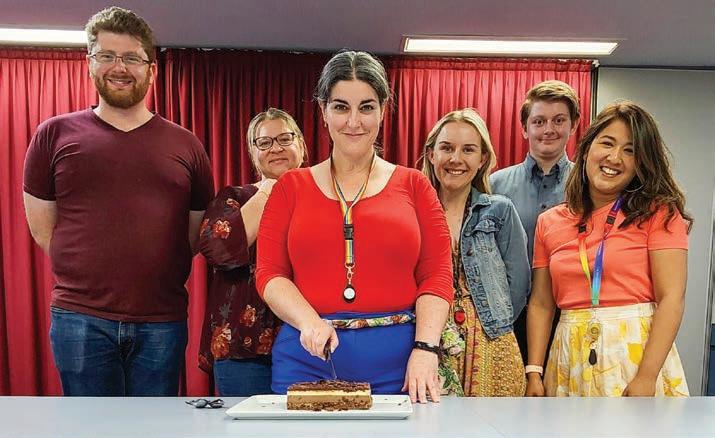
An updated Social Justice Stocktake survey is currently in progress – see QR code below.
Over the past two years, The Salvation Army’s Policy and Advocacy Team has met with over 80 Parliament ministers and senators, speaking with more than a third of the current Parliament. The Salvation Army has a physical presence in 150 of the 151 electorates and is now able to speak to the needs of each one through the Social Justice Stocktake.
“The Salvation Army has always had an understanding of the holistic nature of poverty,” Jennifer says. “In the inquiry we’ve just seen, they’re now talking about poverty in a holistic sense, in terms of an inability to meet basic needs, to find safety, shelter, to participate in society, all of which was in our submission. That’s a new and different way to look at poverty for parliament, but for The Salvation Army, it goes all the way back to [Founder] William Booth.”
The Salvos vision states that “wherever there is hardship or injustice, Salvos will live, love and fight, alongside others, to transform Australia one life at a time with the love of Jesus’. As The Salvation Army’s Policy and Advocacy team marks its five-year anniversary, it prepares to serve that vision for many more years to come.
“The Salvation Army has been here for 140 years,” Jennifer says. “We don’t do six-month horizons or three-year terms. The Salvation Army will be here when the government changes, and then changes again. Our job is to be ready to respond at any time – when an opportunity to transform Australia presents itself, we are here and ready to seize it.”
Scan here to complete the updated Social Justice Stocktake Survey.
13 OUR STORY
13 A PRIL 2024
Jennifer Kirkaldy, centre, with some of her team celebrating the completion of ‘innovation’ stage of The Salvation Army’s Reconcilliation Action Plan.
Cauliflower Soup
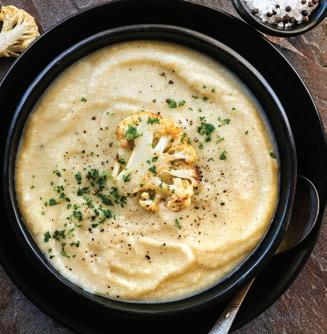
Ingredients
1 large onion, 1 cauliflower, 2 large potatoes, 1 litre chicken stock, salt and pepper to taste, ½ cup cream, croutons and garnish (optional)
Method
• In an oiled saucepan cook chopped onion until soft.
• Add cauliflower florets, chopped potato and chicken stock. Season with salt and pepper.
• Cover and bring to boil.
• Reduce heat to medium/low and simmer for 20 minutes until potato is tender.
• Cool and blend in batches until smooth.
• Return to saucepan over low heat, add cream and stir until heated through.
• Serve with croutons and garnish if desired.

Quick
quiz
1. Which is Australia’s largest national park?
2. Purnululu National Park is situated in which state?
3. Which is the highest peak in Alpine National Park?
4. What is the most famous park in Australia?
5. What is largest sand island in the world?
6. What is the most visited park in New South Wales?
Bible byte
“Everything on earth has its own time and its own season.”
Ecclesiastes chapter 3, verse 1 Contemporary English Version
On which page of this week’s Salvos Magazine is Tum-Tum hiding?

SALVOS MAGAZINE TASTE OF LIFE 14 SALVOS MAGAZINE TASTE OF LIFE
have a laugh

How did the artist win the painting prize? They had strokes of genius. It knew how to draw out laughter. To sketch out their problems.
Why was the pencil such a good comedian?
Why did the artist go to therapy?
Words are hidden vertically, horizontally, diagonally, forwards and backwards.
In 534 BC Thespis performed with his troupe in an Athens marketplace.
In 55 BC Rome’s first stone theatre was built.
The world’s oldest theatre was built in 1585 in Vicenza, Italy. Its inaugural performance was Sophocles’ Oedipus the King.
In 1782, a lady named Mrs Fitzherbert died laughing at a performance of John Gay’s The Beggar’s Opera at the theatre.
Trilby and fedora hats both took their names from plays first performed in the 19th century.
15 TAKE FIVE 15 Quiz :answers 1. Munga-Thirri – Simpson Desert 2. Western Australia 3. Mount Bogong 4. Uluru-Kata Tjuta National Park 5. K’gari (previously Fraser Island) 6. Blue Mountains National Park Tum-Tum: is peeking out from behind the caption on page 13. Wordsearch
Enjoy! Anatomy Architecture Art Artists Astronomy Botany Cards Creativity Celebration Composer Conference Cooking DaVinci Exhibition Film Invention Music Painting Poetry Prints Science Stories Support Videos V A D P B D L A O Q N I C E S A R R S P A I N T I N G N O X A R C T H M U S I C Z N M V N H R C S U P P O R T S J H E E F I R H C A B R C O O K I N G N E B K I I M E B O T A N Y V B T R I C T E P O A N A T O M Y S I E T A E N C C E L E B R A T I O N I R C C V I D E O S T Y X H N C O D T E Y Q Q C A P O E T R Y E N S U F K O G C R E A T I V I T Y R R I K V T H U A S T R O N O M Y E T G X P S T O R I E S F B P X O D A V I N C I C O M P O S E R W F I L M Z J X U L P R I N T S K X W A R T I S T S U Q O K S M T
13 A PRIL 2024
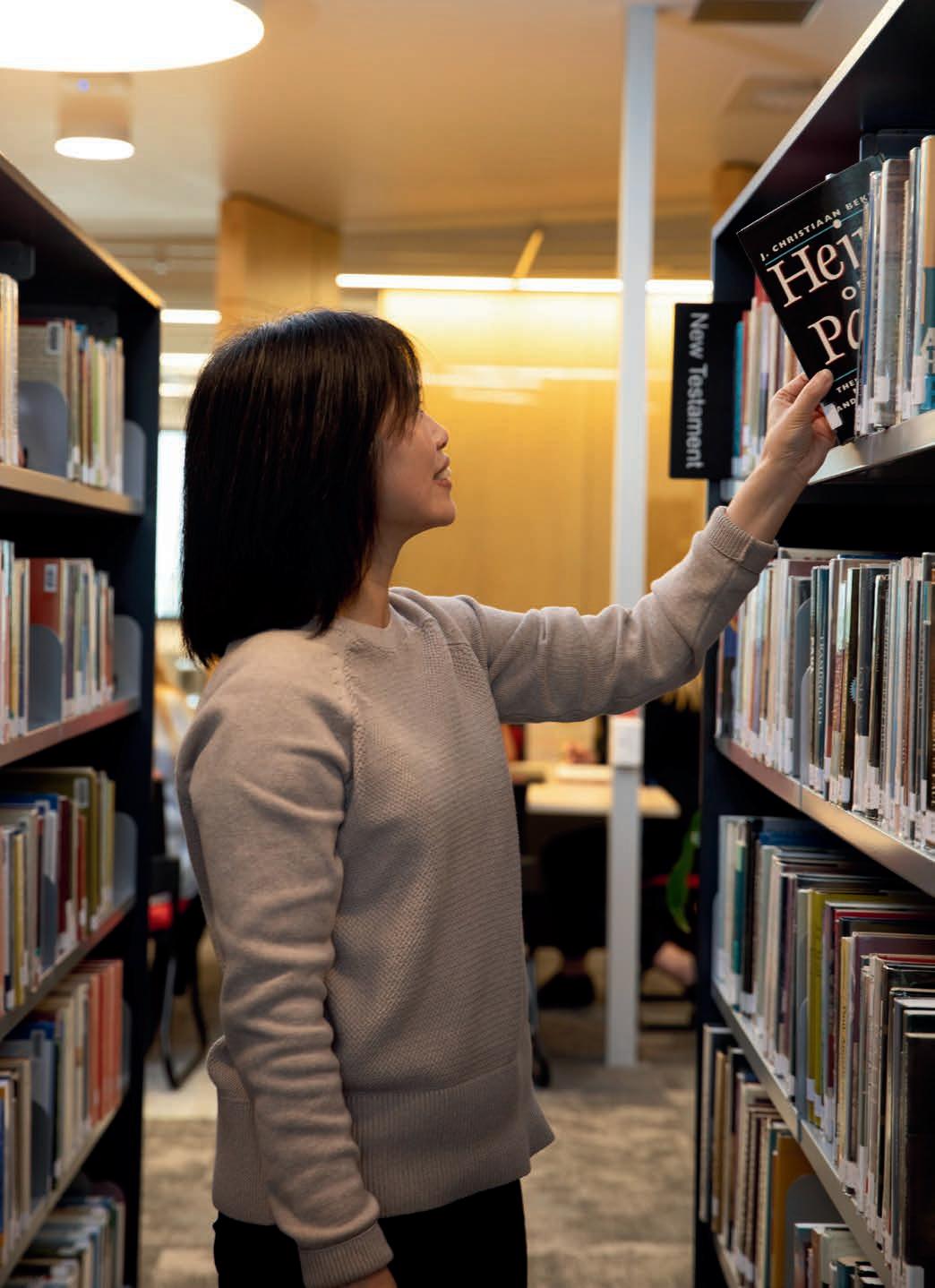
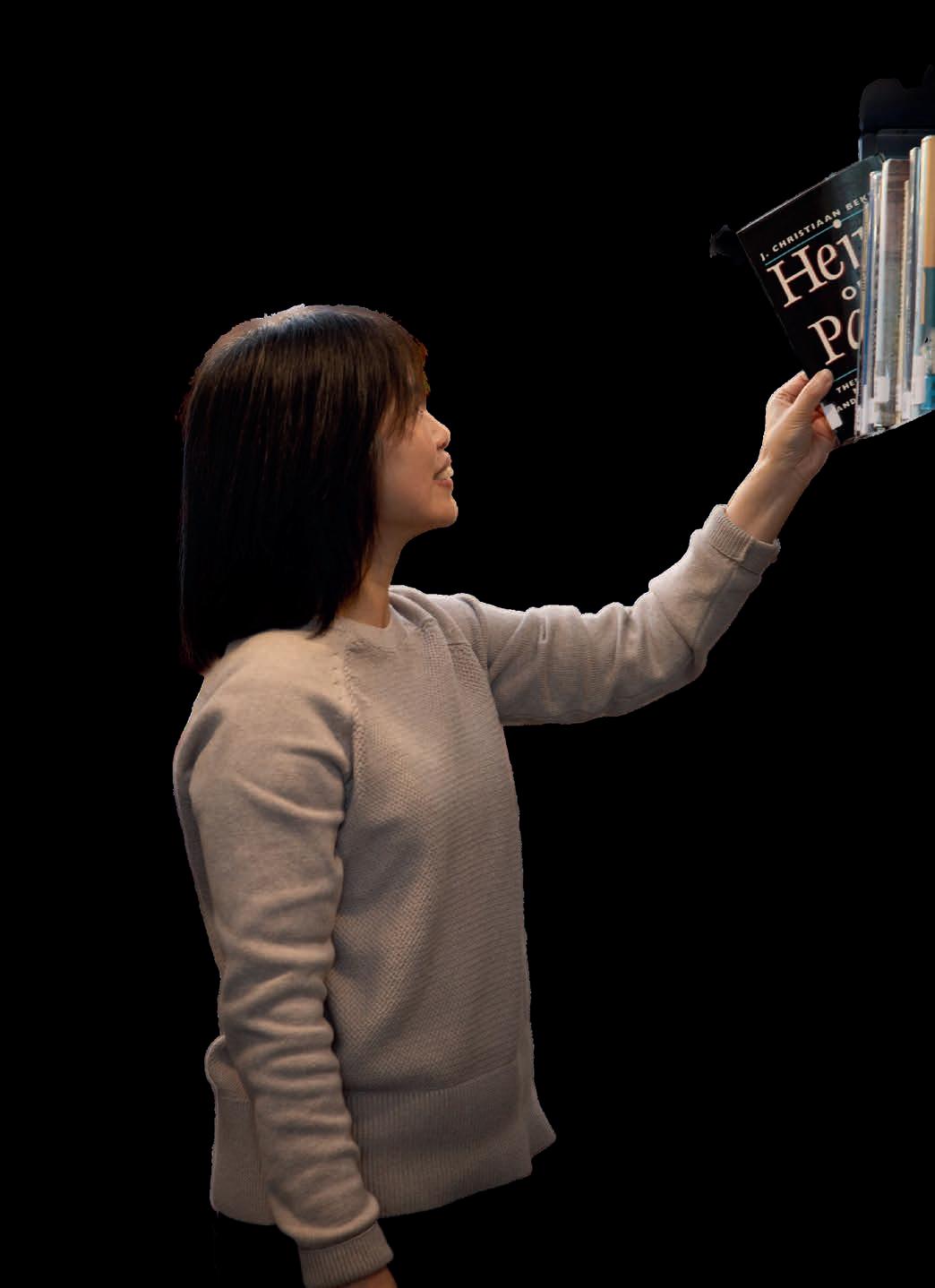
Discover our amazing collection of books and digital resources. Membership is free! JOIN JOIN OUR OUR LIBRARY LIBRARY evaburrowscollege.edu.au/library Eva Burrows Library Opening Hours: Monday to Thursday 8.30am to 4.30pm Fridays CLOSED


































